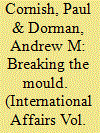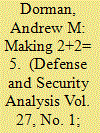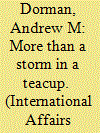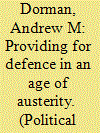|
|
|
Sort Order |
|
|
|
Items / Page
|
|
|
|
|
|
|
| Srl | Item |
| 1 |
ID:
095069


|
|
|
|
|
| Publication |
2010.
|
| Summary/Abstract |
With a strategic defence review expected to begin in 2010, this article reflects upon the history of the review in British defence policy and planning. The authors argue that for decades successive defence reviews have followed a process in which policy development moves through four phases: failure, inertia, formulation and misimplementation. This has resulted in a cycle of defence reviews that have proved to be incomplete and unsustainable: a cycle in which each review leaves so much unfinished business that another radical reappraisal of defence policy is soon thought necessary, and a cycle from which a succession of governments have so far proved unable or unwilling to escape. The article suggests that the strategic defence (and security) review promised for the next parliament is in danger of continuing this pattern of policy deficiency. The authors contest that this need not be the case. With a close understanding of the pattern of past reviews it should be possible for the 2010 review finally to break the mould and produce a coherent and above all sustainable defence policy and strategy.
|
|
|
|
|
|
|
|
|
|
|
|
|
|
|
|
| 2 |
ID:
144832


|
|
|
|
|
| Summary/Abstract |
During 2015 Prime Minister Cameron found himself under intense domestic and international pressure over his apparent reluctance to maintain United Kingdom defence spending at the NATO target level of 2 per cent of GDP. Most commentators attributed this reluctance to the inevitability of defence cuts if the government wished to meet its deficit reduction targets. However, the aftermath of the general election saw a sudden decision to maintain UK defence spending at the NATO target level. This u-turn is one of the more curious episodes in recent British defence policy. In this article we explore the reasons why, at a time of continuing cuts and austerity measures and against all the political signals, a decision was made to meet the 2 per cent target, and what this means for the UK's defence policy. In doing so, we analyse why most commentators assumed that defence cuts were inevitable, the domestic and international factors that explain the government's apparent u-turn and what this revised defence budget settlement meant for the new 2015 National Security Strategy and Strategic Defence and Security Review.
|
|
|
|
|
|
|
|
|
|
|
|
|
|
|
|
| 3 |
ID:
103296


|
|
|
|
|
| Publication |
2011.
|
| Summary/Abstract |
The history of British defence reviews has been one of repeated disappointment: a cycle in which policy failure is followed by a period of inertia, giving way to an attempt at a new policy framework which is then misimplemented by the defence leadership. Each failed defence review therefore sows the seeds of its successor. With this in mind, in 2010 the new coalition government embarked upon an altogether more ambitious exercise: a strategy review comprising a National Security Strategy and a Strategic Defence and Security Review. This article suggests, nevertheless, not only that the 2010 strategy review looks likely to follow past performance, but also that it is coming unstuck at an unprecedented rate. This is a pity since the 2010 review had much to commend it, not least the adoption of a risk-based approach to security and defence policy-making. What is the explanation for this outcome? Is it that the British have, as some have suggested, lost the ability to 'do strategy', if ever they had it? The authors offer a more nuanced understanding of the policy process and argue that the coalition government in fact has a very clear and deliberate strategy-that of national economic recovery. Yet the coalition government cannot allow national defence and security to fail. The authors conclude with an assessment of the options open to the defence leadership as they seek to address the failing 2010 strategy review and suggest a variety of indicators which will demonstrate the intent and seriousness of the political, official and military leadership of the Ministry of Defence.
|
|
|
|
|
|
|
|
|
|
|
|
|
|
|
|
| 4 |
ID:
123887


|
|
|
|
|
| Publication |
2013.
|
| Summary/Abstract |
The next Strategic Defence and Security Review (SDSR) will be held in 2015. With unfinished business from its 2010 predecessor, and with no sign that UK national strategy is about to escape the grip of austerity, the 2015 SDSR is set to be more complex and contentious than the government might have hoped.
There is a possibility that the review will, yet again, see the three armed services struggle against each other to secure the largest slice of a diminishing cake. The review might also be captured by a fruitless discussion of 'grand strategy'. SDSR 2015 must avoid both of these distractions.
There are four principal concerns arising from SDSR 2010: the feasibility of the Future Force 2020 plan, various capability gaps that must be managed, inconsistencies in the national strategic planning framework, and unresolved concerns about the relationship between society, armed forces and government in the UK.
In response to these concerns, the authors argue for a risk-sharing approach to the SDSR, embracing the widest conceivable range of stakeholders in national strategy: the armed services, government departments and agencies, industry, civil society, and allies and partners.
In UK military circles, inter-service cooperation is known as 'jointery' and is denoted by a certain shade of purple. The effect of austerity is to constrain national strategy, just as the international security environment makes ever more demands upon it. In these circumstances, strategic options must be generated by joint collaboration, denoted by as many shades of purple as appropriate.
|
|
|
|
|
|
|
|
|
|
|
|
|
|
|
|
| 5 |
ID:
104152


|
|
|
| 6 |
ID:
006852


|
|
|
|
|
| Publication |
Aldershot, Dartmouth, 1995.
|
| Description |
xiii, 209p.
|
| Standard Number |
1855215799
|
|
|
|
|
|
|
|
|
|
|
|
Copies: C:1/I:0,R:0,Q:0
Circulation
| Accession# | Call# | Current Location | Status | Policy | Location |
| 038680 | 341.584/DOR 038680 | Main | On Shelf | General | |
|
|
|
|
| 7 |
ID:
131445


|
|
|
|
|
| Publication |
2014.
|
| Summary/Abstract |
In September 2014 the people of Scotland will vote on whether to become an independent nation, with the defence and security of Scotland proving to be one of the more vociferous areas of debate. This article argues that defence and security implications of this referendum are far more fundamental than either the 'yes' or 'no' campaigns have admitted. It makes four points. First, it suggests that the Scottish government's plans for defence and security in NATO and the EU are at odds with its proposed armed forces and that Scotland may well find itself having to make far greater commitments to defence to assure its allies. Second, it argues that a vote for independence will represent a game-changing event for the remainder of the United Kingdom's defence and security, which will have significant consequences for the United Kingdom's partners and allies in NATO, the European Union and elsewhere. Third, the article contends that even a vote against independence will have a long-term impact, in that the 'West Lothian question' and Scottish support for nuclear disarmament influence the 2015 Strategic Defence and Security Review. Finally, the article highlights how this issue has revealed weaknesses in the think-tank and academic communities, particularly in Scotland. The independence vote does, therefore, represent 'more than a storm in a tea cup' and thus there needs to be far greater engagement with these issues within the United Kingdom and elsewhere
|
|
|
|
|
|
|
|
|
|
|
|
|
|
|
|
| 8 |
ID:
111914


|
|
|
|
|
| Publication |
2012.
|
| Summary/Abstract |
NATO and its members are beginning to gear themselves up for the summit in Chicago in May 2012. Such summits are always important, especially when they are held in the United States during an election year and in the aftermath of the French presidential elections. This article addresses the issues that are likely to be most prominent at the Chicago summit-NATO's wars; enlargement and Russia; burden-sharing; and divergent agendas-before drawing some general conclusions. The outstanding question is whether these issues will lead to division within NATO and hence its possible demise-or will they be finessed?
|
|
|
|
|
|
|
|
|
|
|
|
|
|
|
|
| 9 |
ID:
099090


|
|
|
| 10 |
ID:
111909


|
|
|
|
|
| Publication |
2012.
|
| Summary/Abstract |
One of the first steps taken by the newly elected Conservative-Liberal Democrat coalition government was to initiate a review of the national strategy of the United Kingdom. The review culminated in October 2010 in the publication of a revised National Security Strategy as well as a new Strategic Defence and Security Review. With the benefit of over twelve months of hindsight, this article is concerned with the formulation, the implementation and the longer-term implications of the 2010 strategy review. The first part of the article assesses the review as a national strategic plan. What were the strategic challenges addressed by the review, what decisions, judgements and misjudgements were made, and what was overlooked? In part two the authors turn to operational matters: how far was the UK's post-review strategic experience (i.e. in Afghanistan and Libya) consistent with the decisions and promises made in 2010? Part three discusses the review as a public statement of national policy, gauging the impression it has made on the national strategic narrative since 2010: how was the review received, what reputation has it acquired and what was/is the quality of the debate surrounding it? Finally, in part four the article asks what the 2010 review and its aftermath reveal of the formulation and implementation of national strategy in the United Kingdom. Was the 2010 review simply the latest in a long series of attempts by government to find a convincing and durable compromise between security challenges and national resources? Or was the review the beginning of something different altogether? Could UK national strategy henceforth be more of an adaptive, iterative process than a compressed period of analysis and reflection followed by the publication of a policy statement with an inevitably brief shelf-life?
|
|
|
|
|
|
|
|
|
|
|
|
|
|
|
|
|
|
|
|
|